








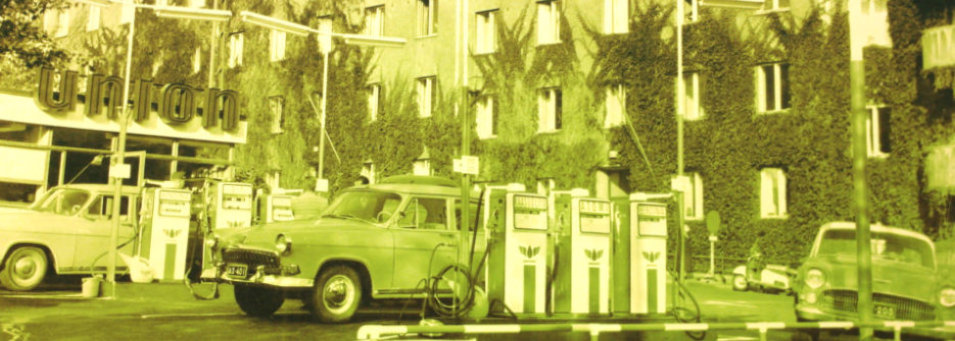

The Swinging 60´s



Austin 850 Pickup - 1962
The Mini is a small economy car made by the British Motor Corporation (BMC) and its successors from 1959 until 2000. A pick-up truck (technically a coupé utility by definition), 11 ft (3.4 m) in total length
by definition), 11 ft (3.4 m) in total length was built on the longer Mini Van platform,
was built on the longer Mini Van platform, with an open-top rear cargo area and a
with an open-top rear cargo area and a tailgate. The factory specified the weight of
tailgate. The factory specified the weight of the Pick-up as less than 1,500 lb (680 kg)
the Pick-up as less than 1,500 lb (680 kg) with a full 6 imperial gallons (27 l; 7.2 US
with a full 6 imperial gallons (27 l; 7.2 US gal) tank of fuel.
gal) tank of fuel. A total of 58,179 Mini Pick-up models were
A total of 58,179 Mini Pick-up models were built. Brand from Sime Darby Motors.
built. Brand from Sime Darby Motors.


Opel Kadett A - 1964
The Kadett was re-introduced in 1962, with deliveries beginning on 2 October, a little
deliveries beginning on 2 October, a little more than 22 years after the original model
more than 22 years after the original model was discontinued in May 1940. The new car
was discontinued in May 1940. The new car (designated the Kadett A) was a small family
(designated the Kadett A) was a small family car like its predecessor, although it was now
car like its predecessor, although it was now available in 2-door saloon, 3-door Car-A-Van
available in 2-door saloon, 3-door Car-A-Van (estate) and coupé versions.
(estate) and coupé versions.


Panhard PL17 - 1961
Panhard is a French manufacturer of light tactical and military vehicles. Its current
tactical and military vehicles. Its current incarnation was formed by the acquisition of
incarnation was formed by the acquisition of Panhard by Auverland in 2005. Panhard had
Panhard by Auverland in 2005. Panhard had been under Citroën ownership, then PSA
been under Citroën ownership, then PSA (after the 1974 Peugeot Citroën merger), for
(after the 1974 Peugeot Citroën merger), for 40 years. The combined company now uses
40 years. The combined company now uses the Panhard name; this was decided based on
studies indicating that the Panhard name had
the Panhard name; this was decided based on
studies indicating that the Panhard name had better brand recognition worldwide than the
better brand recognition worldwide than the Auverland name. Panhard once built civilian
Auverland name. Panhard once built civilian cars but ceased production of those in 1968.
cars but ceased production of those in 1968. Many of its military products however end up
Many of its military products however end up on the civilian market via third sources and
on the civilian market via third sources and as military/government surplus vehicles.
as military/government surplus vehicles. Panhard also built railbuses between the
Panhard also built railbuses between the wars.
wars.



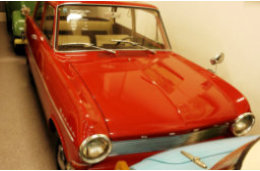
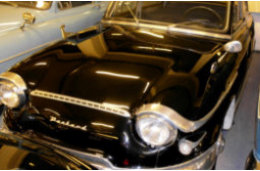
Simca Aronde P60 - 1960
The Simca Aronde was a family car manufactured by the French automaker Simca from 1951 to 1963. It was Simca's first original design (earlier models were all to a greater or lesser extent based on Fiats), as well as the company's first unibody car.

Moskvich 407 - 1961
Moskvitch (Russian: Москвич) (sometimes also written as Moskvich, Moskvič or
also written as Moskvich, Moskvič or Moskwitsch) was an automobile brand from
Moskwitsch) was an automobile brand from Russia produced by AZLK from 1945 to 1991
Russia produced by AZLK from 1945 to 1991 and by OAO Moskvitch from 1991 to 2002.
and by OAO Moskvitch from 1991 to 2002. The current article incorporates information
The current article incorporates information about both the brand and the joint-stock
about both the brand and the joint-stock successor of AZLK for the sake of simplicity.
successor of AZLK for the sake of simplicity.


Renault Dauphine - 1965
As Louis Renault's successor, and as Renault's chairman, Pierre Lefaucheux continued to
chairman, Pierre Lefaucheux continued to defy the postwar French Ministry of Industrial
Production — which had wanted to convert
defy the postwar French Ministry of Industrial
Production — which had wanted to convert Renault solely to truck manufacture.[6]
Renault solely to truck manufacture.[6] Lefaucheux instead saw Renault's survival in
Lefaucheux instead saw Renault's survival in automobiles and achieved considerable
automobiles and achieved considerable success with the 4CV, with over 500,000
success with the 4CV, with over 500,000 produced by 1954.
The Dauphine was born during a conversation
produced by 1954.
The Dauphine was born during a conversation with Lefaucheux and engineer Fernand
with Lefaucheux and engineer Fernand Picard. The two agreed the 4CV was
Picard. The two agreed the 4CV was appropriate in its postwar context, but that
appropriate in its postwar context, but that French consumers would soon need a car
French consumers would soon need a car appropriate for their increasing standard of
appropriate for their increasing standard of living
living


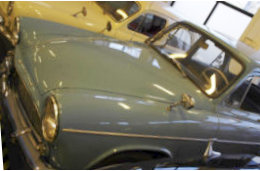
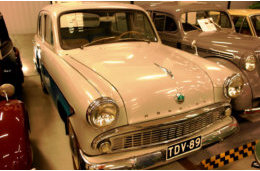
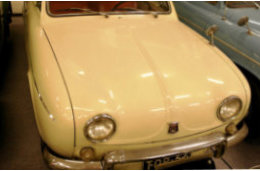
1960-1969
As the 1960s began, American cars showed a rapid rejection of 1950s styling excess, and would remain relatively clean and boxy for the entire decade. The horsepower race reached its climax in the late 1960s, with muscle cars sold by most makes. The compact Ford Mustang, launched in 1964, was one
The horsepower race reached its climax in the late 1960s, with muscle cars sold by most makes. The compact Ford Mustang, launched in 1964, was one of the decade's greatest successes. The "Big Three" American automakers enjoyed their highest ever sales and profitability in the 1960s, but the demise
of the decade's greatest successes. The "Big Three" American automakers enjoyed their highest ever sales and profitability in the 1960s, but the demise of Studebaker in 1966 left American Motors Corporation as the last significant independent. The decade would see the car market split into different
of Studebaker in 1966 left American Motors Corporation as the last significant independent. The decade would see the car market split into different size classes for the first time, and model lineups now included compact and mid-sized cars in addition to full-sized ones.
size classes for the first time, and model lineups now included compact and mid-sized cars in addition to full-sized ones. The popular modern hatchback, with front-wheel-drive and a two-box configuration, was born in 1965 with the introduction of the Renault 16,many of
The popular modern hatchback, with front-wheel-drive and a two-box configuration, was born in 1965 with the introduction of the Renault 16,many of this car's design principles live on in its modern counterparts: a large rear opening incorporating the rear window, foldable rear seats to extend boot
this car's design principles live on in its modern counterparts: a large rear opening incorporating the rear window, foldable rear seats to extend boot space. The Mini, released in 1959, had first popularised the front wheel drive two-box configuration, but technically was not a hatchback as it had a
space. The Mini, released in 1959, had first popularised the front wheel drive two-box configuration, but technically was not a hatchback as it had a fold-down bootlid.
fold-down bootlid. Japanese cars also began to gain acceptance in the Western market, and popular economy models such as the Toyota Corolla, Datsun 510, and the first
Japanese cars also began to gain acceptance in the Western market, and popular economy models such as the Toyota Corolla, Datsun 510, and the first popular Japanese sports car, the Datsun 240Z, were released in the mid- to late-1960s.
popular Japanese sports car, the Datsun 240Z, were released in the mid- to late-1960s.



Photos mainly by Matti Kreivilä. Historical facts and technical details of the vehicles provided by Wikipedia. Movies YouTube.












